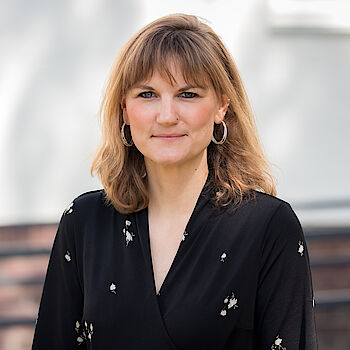Detecting multiple sclerosis, Alzheimer's disease, stroke or cardiovascular diseases in the retina of the eye and observing them as they progress - with the help of innovative digital technologies: Prof. Dr. Hanna G. Zimmermann is conducting research on this. She has been a junior professor for "Applied Visual System Research" at the ECDF and Charité - Universitätsmedizin Berlin since June 2022. Hanna Zimmermann describes the retina as a "window to disease": "The retina is part of the central nervous system, there are the same nerve cells here as in the brain. If there is a loss of nerve fibers in diseases such as multiple sclerosis, this also has an effect in the retina in the form of minimal changes in the thickness of the nerve layers. By measuring these changes, we can calculate, for example, how likely another disease flare-up in multiple sclerosis is to occur soon. If necessary, more effective therapy can then be initiated as a preventive measure."
Zimmermann works with images of the retina from devices that are already widely used in many clinics and ophthalmologists' offices - but currently mostly to study eye diseases such as age-related macular degeneration. Use for neurological diseases such as multiple sclerosis has not yet become routine. The retinal examination is much more high-resolution and at the same time easier and cheaper to perform than, for example, an MRI of the brain. However, the images alone are of limited use in deriving individualized information for diagnosis, risk assessment and monitoring of disease progression. Here, Zimmermann still sees a lot of potential for the use of digital technologies and artificial intelligence, especially innovative machine learning methods such as deep learning. In addition to the nerve structures, pathological changes in the blood vessels at the retina can also be examined in this way. In this way, risk factors for neurological and vascular diseases could already be identified during routine retinal examinations in the future. The junior professor would also like to focus on digital tools in her teaching: "In medicine, the confident use of computers and knowledge of data processing programs are indispensable. This knowledge must be part of medical training; I would especially like to get young women interested in digital methods, because they will benefit greatly from them in the course of their careers," says Zimmermann.
Zimmermann studied physical engineering - medical physics and then earned a doctorate in medical sciences. "I am happy that I can work with an interdisciplinary network of medical doctors, computer scientists, data scientists and other disciplines at the ECDF. Hopefully, in a few years, our research results will be used in routine medical practice to improve medical care for many people through a simple examination."
News in detail
New professorship: Hanna G. Zimmermann studies the eye with the help of innovative digital technologies

© Felix Petermann
